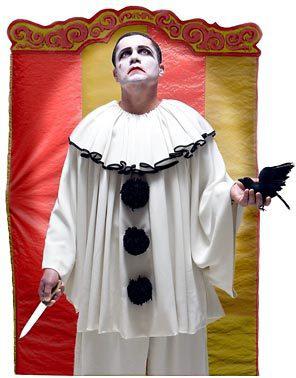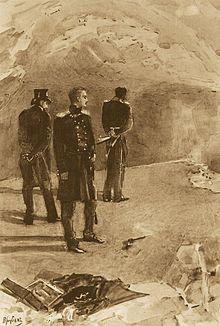"The presentation is over!" - we say with irony, if some unseemly, dubious business has ended. Even more often in this case, we use the phrase, which has long become a catchword: "Finita la comedy!" What is its origin, what semantic shades does it enclose in itself, and how often is it used - we’ll talk about this.
Real sound
This is tracing paper, that is, a copy recorded in Russian letters, without translating the meaning of the phrase finita la commedia, which is attributed to the Italian language, “finita la comedy”. The translation sounds like this - "comedy is over." However, according to the grammar rules of the Italian language, it is more correct to say: La commedia e finita. That is exactly what the phrase “finita la comedy” sounds in Italian.
The end of the plot!
Since this expression has become stable in the Russian language, philologists attribute it to the category of phraseological units. The meaning assigned to this phraseological unit is semantically connected with another stable expression: “breaking comedy,” which means pretense, an attempt to mislead. If someone acted not in honor, covered good deeds with good slogans, and this came to an end, it would be appropriate to say: “Finita is a comedy!” - which means: "The game is over, now everything will fall into place, and the truth will open."
Put a point
This phraseological unit has another lexical connotation. Suppose someone participated in events in which he was assigned a role worthy of blame. Or he is involved in a reprehensible situation as a participant and a victim. Then at the end of these events this person may exclaim: “Finita is a comedy!” - which means: “Enough, point, that's it!” The last word, by the way, also came to us from Italian, or rather, from its predecessor, the Latin language. The word basta means "enough is enough."
When a phrase came into use
It is believed that the famous saying "Finita la comedy!" came into use after the opera "Pagliacci" appeared (author - Ruggero Leoncavallo). However, chronologically, this thesis is not confirmed in any way: the fact is that the Russian reader saw this phrase in the novel “Hero of Our Time” by Mikhail Yurievich Lermontov. Phraseologism came from the mouth of Pechorin, after he shot his friend Grushnitsky in a duel. The novel was written no later than 1840, and the premiere of the opera “Pagliacci” took place almost half a century later, in 1892.
"Clowns"
The opera begins unconventionally: during a musical prologue, a clown suddenly appears on the stage in front of the curtains still closed and warns the audience that the opera is inspired by life itself, and its theme is genuine feelings and passions. Then the curtain opens and the performance begins. The plot is based on the fact that in real life and in the theatrical game of actors of a vagrant troupe, love, jealousy and death are intertwined. Clown Tonio is in love with comedian Nedda, the wife of the actor and owner of the troupe Canio. She rejects the courtship of the clown, giving preference to the young peasant Silvio. The wounded Tonio reports this to the husband of the unfaithful woman, and he furiously rushes to the traitor with a knife. But the time has come for the performance, and we must go on stage. "It's time to start, it's time to put on a suit!" - one of the most famous arias in the world opera.

In Colombina’s costume, Nedda, according to the plot of the comedy played for the peasants, lets Harlequin fall in love with him, whispering to him the same words that Canio had recently heard at the van where Silvio and Nedda agreed on a love date. Canio in the role of the Payak, beside herself with passion and jealousy, proceeds to Colombine-Nedda with the demand to reveal the name of her lover, she tries to laugh it off and play the comedy further, hiding the horror that gripped her. But for Canio, this is no longer a spectacle, but life. He does not let his wife off the stage and in a fit of rage stabs her with a knife. When dying, Nedda calls his beloved, he jumps off the bench, and the Clown also kills him. When the shocked Canio drops a knife from his hands, the clown turns to the public with the words: "Comedy is over."
What did Pechorin want to say?
The character of this character, whose surname contains a reference to another hero characteristic of his era and also an extraordinary one - Onegin (novel by A. S. Pushkin “Eugene Onegin”), is distinguished by individualism and great spiritual potential. A sharp mind, a rich inner world and the beautiful impulses inherent in Pechorin, did not find a response and application, and therefore "sour", poisoned the soul of this person with bitterness. Shooting Grushnitsky, whose image was created as the exact opposite of the figure of Pechorin, the protagonist challenges his whole life. It is noteworthy that the character does not pronounce a replica in French, as was customary among the nobility in that era. This indicates that Pechorin put sincere feelings into his words - irony and pain. By the way, the phrase "finita la comedy" in French sounds like this: compacte la comédie.
Where did the hero of Lermontov get these words
Researchers believe that Pechorin spoiled the words of the Roman emperor Augustus, which he said on his deathbed: do not they find that he perfectly played the comedy of his life? The ruler used a quote from the Italian comedy of masks (commedia dell arte).
Comedy del arte is a folk theater showing performances in the public squares of the city. Its specificity was the presence of the same masks, putting on which, the actors were transformed into permanent characters - Harlequin, Pantalone, Colombin, Tartaglia and others. Another important feature of the theater del arte was improvisation: the scenes were played according to a given conditional plot scheme, which the artists performed impromptu.
Lermontov wrote that, according to legend, the great French Renaissance writer Francois Rabelais said before his death almost the same words as Augustus, wanting to emphasize that his whole life was a theater: "Comedy is played, lower the curtain." Pechorin, as an educated and well-read person, could certainly know about these historical episodes.
Formula for the genre
Another explanation of why the hero of the Lermontov work could say the phrase “Finita la comedy!” Is the assumption of literary scholars that the novel itself is built according to the type of dramatic action. This is especially true of the story "Princess Mary", in which these words were sounded. Here Pechorin, writing in his diary the most secret and subtle observations and spiritual movements, acts as the creator and performer of his own performance. Thus, the words "Finita la comedy!" - This is a leitmotif that defines the meaning and plot perspective of the story.
Epitaph

When meeting with Pechorin on the waters, Grushnitsky expresses his creed in French to him - in order not to despise people, he hates them, otherwise life would become a disgusting farce. Fars is a medieval areal comedy, rude and not complicated by great meaning. So Grushnitsky expressed an impatient desire to excel people and a sharp fear of contempt. Pechorin recognized his egocentrism and posturing. And it was he who turned out to be the man who did not fit into the model of relations with the world that Grushnitsky developed and stood in his way. Therefore, he cried out, standing on the edge of the cliff, that there was no place for the two of them on the earth, and now he had already said that he despised himself and hated Pechorin. With a shot Pechorin put an end to this farce, the performance of the life of a failed hero who descended from arrogance to the realization of his insignificance: “Finita is a comedy!” No doubt he applied this statement to himself. But it cannot be said that the genre of the play that is played out in the life of Pechorin himself is farce. Therefore, the meaning of the phrase he said deepens to the meaning of the epitaph “to the grave” of the entire distorted and false mode of existence.
Who likes Italian words?
One can find the phrase “Finita la comedy!”, The meaning of which fits into the semantic framework described above, in many literary works. She was told by Dr. Astrov on the day of the departure of Professor Serebryakova with his wife, ironically emphasizing the absurdity of the passion for professor wife Elena Andreevna (the play by A. P. Chekhov “Uncle Vanya”). A decade earlier, Chekhov used this phrase in the play “Fatherless”.
This expression is in the title of the detective Irina Melnikova on the disclosure of terrible and mysterious crimes. It sounds in the epilogue of the novel by Albert Likhanov “Broken Doll” as a desperate cry for the degradation and devastation of human souls. Konstantin Paustovsky uses this phraseology in the documentary novel “A Book of Life. Far years. " The writer Mamin-Sibiryak fell in love with this expression, we find it in the novels “Bread”, “Features from the Life of Pepko”, “Privalovye Millions”. She is in the works of Pisemsky, Leskov, Ogarev, Bulgakov.
Especially the phraseological unit came to the taste of journalism. It was used by literary men of the past (F. Bulgarin, L. Shestov, etc.), modern journalists willingly adorn them with articles and headings.